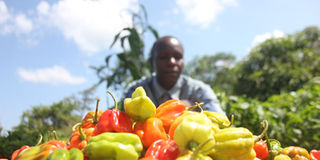Gov’t issues new rules for horticultural exporters

A man displays pepper from his farm. Hot pepper accounts for about 70 per cent of all the country’s horticultural exports. Photo by Abubaker Lubowa
What you need to know:
Part of the changes requires exporters to stop using manual methods of applying for export certificates and adopt digital means, Dorothy Nakaweesi writes.
Horticulture exporters have been pushed in a tight corner as the ministry of Agriculture repositions its internal operations aimed at growing the industry.
The ministry’s action follows several warning by the European Union (EU) - Uganda’s biggest horticultural market, probing the exporters for shipping products which don’t comply with the Phytosanitary safety requirements.
As a result, several consignments of Ugandan horticultural products were intercepted and export advisories were issued.
Explaining their plight to this newspaper, Ms Juliet Musoke, the executive director of Uganda Flower Exporters Association, (UFEA) said: “For the last two weeks, we have been tossed from one office to another to get signatures and stamps of our phytosanitary certificates.”
According to Ms Musoke, this confusion has created a crisis for shippers/ exporters, causing them to lose money.
“We have been running (tossed) between Namelere and Entebbe to get Phytosanitary certificates signed. This is eating into our schedules’ time and causing delays,” Ms Musoke shared.
Ministry view
To arrest the situation, government through ministry of Agriculture, has made structural changes aimed at cleaning the house and protecting the market.
In an interview with Daily Monitor, the Commissioner Crop Protection Dr OKasai Opolot, said: “Exporters should bear with the internal changes within the department. We all want to grow our exports and increase annual earnings from the current $50 million (Shs182 billion).”
In the new measures, Dr Okasai said there will be no further export of hot pepper and Murray leaves until all the exporters are certified.
Part of the changes requires exporters to stop using manual methods of applying for export certificates and adopt digital means.
In addition, exporters are expected to provide their exporting schedules 24 hours before to allow the ministry to carry out its inspections before the flight.
“We had a meeting and I have explained the changes to them. We are going to follow this with an official statement,” he added.
Fruits exporters speak
However, according to the Uganda Fruits and Vegetable Exporters and Producers Association (UFVEPA) -a consortium of 55 exporting companies, the ministry has not yet responded to their list of issues.
In their meeting with the ministry officials, UFVEPA requested the ministry to appoint an airport inspector to do the work but this has not happened.
Ms Hasifa Tushabe, the association’s coordinator in an interview with Daily Monitor, said: “The export suspension of hot pepper was done without them being notified and this is destined to destabilise and demoralise the farmers because we have stopped the orders.”
She said the blanket suspension of hot pepper exports is going to affect the horticultural industry.
“Hot pepper takes about 70 per cent of all the country’s horticultural exports,” Ms Tushabe echoed.
Worse still, the exporters claim they have received no official communication from MAAIF about these abrupt changes and no one has come out to address the exporters.
“I believe the action was taken without due diligence and dialogue with the sector stakeholders in order to find a mutual solution, given that we are unaware of what brought about these abrupt changes,” she added.
Delay effect
According to Ms Musoke, delayed inspection and approval compromises the quality of the product and the cost of any quality issues is always bone by the exporter.
If, for example, shipment is intercepted without proper documentation, they arrive damaged); there is a high cost of interception at the point of destination due to errors in in the export documents.
“Exporters stand to incur one day losses, ranging from dead freight charges for space that has not been utilised and was booked earlier to fines and charges for not delivering cargo to the market,” Ms Musoke said.
Airfreight and handling charge and dead freight charger it cost not less than $100,000 (Shs365 million) per day. If exporters do not deliver to the market – minimum for not delivering to market /fine charged is $600,000 (Shs2.1 billion) for exporters.
When it comes to cuttings export /shipment for this week, orders were made in October 2016.
She said: “So any delays to ship by one day or no shipment at all would jeopardise the entire value chain, resulting in the loss of revenue for the companies and Uganda.”
Similarly, the Cut Roses who supply to bigger supermarkets stand to lose their contracts if they do not meet the orders as planned.
“When these kinds of decisions are taken abruptly, Uganda stands lose to its regional competitors like Ethiopia and Kenya and international one line Colombia and Ecuador,” Ms Musoke shared.




